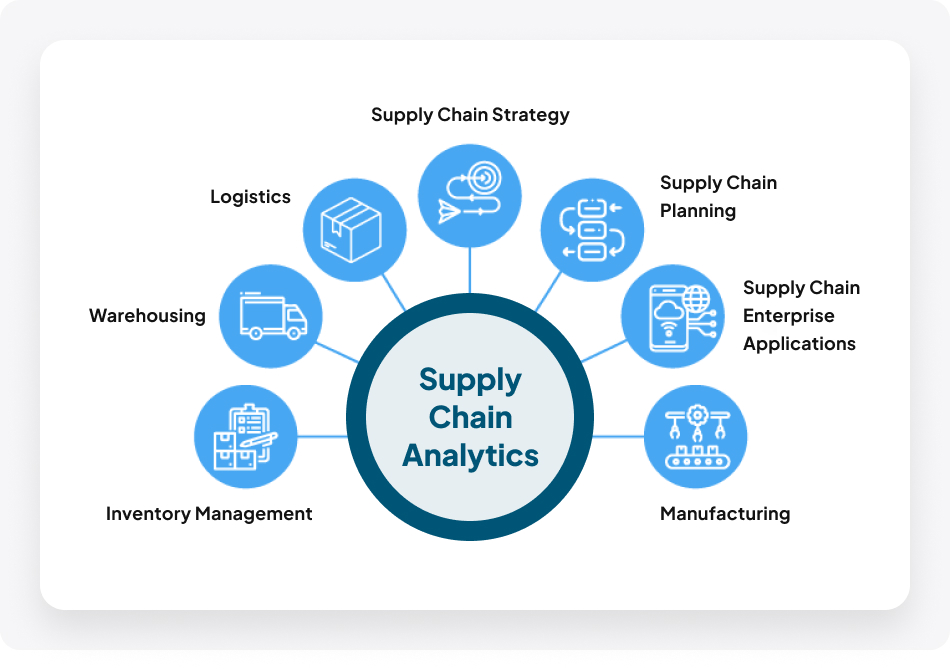What is Supply Chain Analytics Consulting?
By harnessing the power of data analytics and technology, Supply Chain Analytics consulting cons enables organizations to gain deep insights into the intricate workings of their supply chain, spanning procurement, production, distribution, and logistics. The primary purpose of Supply Chain Analytics is to assist in improving operational performance, reducing costs, managing risks, and enhancing customer satisfaction.

Questions That Supply Chain Analytics answers




How Can Supply Chain Analytics Help Your Business?
As supply chain consultant we utilize predictive models and sophisticated algorithms, Supply Chain Data Analytics assists in forecasting demand, optimizing inventory levels, and enhancing procurement strategies. This empowers companies to make informed decisions and execute efficient resource allocation, ultimately reducing costs while boosting operational efficiency.

Why Supply Chain Analytics?
The data-driven insights aid in risk mitigation by identifying potential disruptions in the supply chain, allowing proactive measures to ensure continuity and resilience. Evaluating supplier performance is also facilitated, which ensures stronger partnerships and reliability. With continuous analysis and adaptation to market trends, Supply Chain Solutions enables companies to foster agility, adaptability, and responsiveness, ensuring a competitive edge in the business landscape.

Ready to Make Smarter Decisions with Supply Chain Analytics?
Optimize Your Supply Chain StrategyWho In your Team Can Get benefited with
Supply Chain Data Analytics
Chief Operating Officer (COO)
Operational Efficiency
Supply Chain Solutions enables the COO to streamline operations, reducing bottlenecks and optimizing processes. It helps in identifying areas for improved efficiency and resource utilization.
Chief Marketing Officer (CMO)
Market Responsiveness
CMOs can capitalize on Supply Chain Analytics to align marketing strategies with the real-time availability of products, ensuring campaigns coincide with actual inventory levels.
Chief Financial Officer (CFO)
Cost Reduction
CFOs benefit from cost reduction opportunities identified through inventory optimization and logistics efficiency, leading to reduced holding costs, minimized transportation expenses, and optimized resource allocation.
Chief Information Officer (CIO)
Data-Driven Decision Making
CIOs leverage Supply Chain Analytics to advance data-driven decision-making processes, enhancing the company's technological infrastructure for efficient data processing and analysis.
Other Stakeholders
Risk Management
Identify and mitigate potential risks, offering enhanced risk management strategies across the organization.
Supplier Relations
Get insights from supplier analytics and maintain high-performing supplier relationships, ensuring consistency and reliability in the supply chain.
Our Approach

Explore Unique Business Cases that We Solved
Browse All CasesFrequently Asked Questions
In our commitment to provide you with the best experience, we’ve compiled a list of frequently asked questions that can help clarify any doubts you may have. If you don’t find your answer please don’t hesitate to contact us.
To get started, contact Innovatics for a consultation. Please visit our contact us page for details or fill out the contact form to reach us. Our supply chain consultants will connect to assist you with your supply chain analytics needs.
Innovatics prioritizes data security by implementing robust encryption, secure access protocols, and regular security audits. We adhere to industry best practices to ensure your supply chain data remains confidential and secure.
Yes, Innovatics uses supply chain analytics to identify areas for improvement in inventory management, logistics, and supplier performance. Our data-driven approach helps streamline processes, and reduce costs for overall efficiency.
Absolutely. Innovatics offers comprehensive supply chain consulting services to help you develop a robust supply chain strategy. We leverage supply chain analytics to forecast demand, optimize resources, and manage risks effectively.













